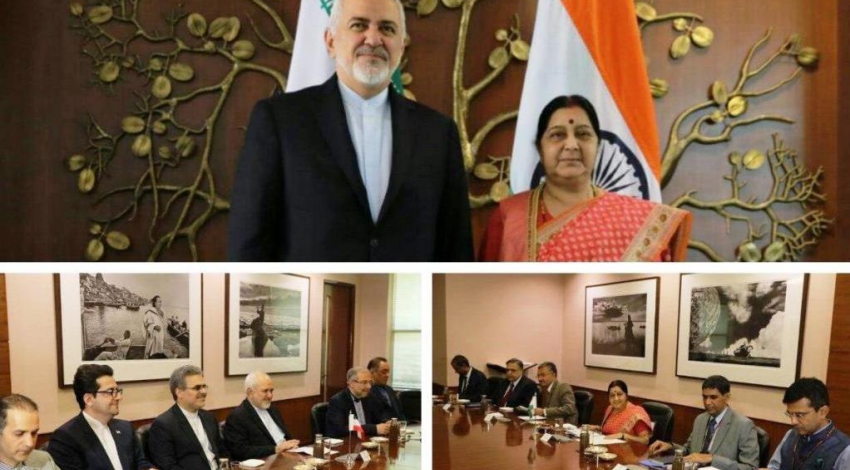Tuesday 14 May 2019 - 18:15
Story Code : 348852
Zarif's trip to India, strategy for active diplomacy
Prior to his visit to India and during his two-day trip to Turkmenistan, Zarif pursued the goals in line with the goals of his recent visit to Moscow and Sochi in Russia, especially in the juncture that recent moves by the United States and its regional allies gradually are leading to make the Middle East more destabilized.
Iranian FM on the eve of his arrival in New Delhi, in talks with reporters, described New Delhi as one of Tehran's close partners who has very broad communication with Tehran in various areas, and emphasized, 'For this reason, we have always consultation with Indian partners in various fields that I will follow these consultations on this trip. '
Foreign Minister has pointed to Iran's vast economic relations with India, calling it one of Iran's largest crude oil customers, and stated, 'A special financial system between us and Delhi has already been designed that the system has been used and is being used for bilateral cooperation.'
The Ministry of External Affairs website also wrote today that Iran's Foreign Minister met with Indian Foreign Minister Sushma Swaraj on the latest regional and international developments and positions of the two countries on these issues, as well as on JCPOA.
Iranian media also announced that Zarif will participate in the 11th meeting of the Joint Commission of Consular Affairs of the two countries in New Delhi, which facilitates the issuance of visas, especially for businessmen and tourists from both countries and solving the problem of prisoners on both sides.
But an Indian media outlet today poses another aspect of Zarif's trip to India, and wrote, 'As Iran reacts to unilateral US sanctions the country is gradually moving away from a nuclear deal, Zarif traveled to India to express positions and point of view of Tehran to Indian authorities.�
The Times of India wrote in this regard, 'Although Zarif will today negotiate with Swaraj and with India's National Security Advisor Ajit Doval, the government will closely address the comments of Javad Zarif, but given that in the current situation national elections are underway, they will probably not give Iran a definitive answer.'
Regardless of the goals previously set for this visit, the Iranian Foreign Minister, at this time, especially after the start of the mischievous measures of some trans-regional hostile states and their regional allies, is working with the help of friends of Iran, including Russia, Turkmenistan, China and some other countries to find a solution to foil conspiracies.
India is also one of those friendly countries that has long started extensive relations with Iran in major areas such as energy, banking, transportation and investment in the strategic port of Chabahar; areas of strategic importance for the bilateral engagement of the two countries to achieve bilateral and multilateral goals, in particular, that the country cannot ignore the exceptional opportunities to provide sustainable energy through Iran and, on the other hand, its long-term goal of setting up an economic corridor from the south to the north through Iran reach to Central Asia, the Caucasus and Europe.
This country has signed several agreements with Iran in recent years, which 15 of them have been finalized in the Iranian President's visit to New Delhi two years ago.
Agreements on avoidance of double taxation, agricultural cooperation, promotion of cooperation between the two chambers of commerce and banking agreements, as well as contracts for the cooperation of Tehran and New Delhi in the Port Chabahr project, which creates some unique opportunities for Delhi so that it can easily reach the world's most important markets, including Eurasia.
Therefore, the Iranian FM, considering all these considerations and in order to maintain economic relations with India which the volume of trade between the two countries has risen from $ 13.6 billion in 2017 to about $ 17 billion in a recent year, departed for New Delhi to achieve both the bilateral goals and the multilateral goals.
Zarif well knows that New Delhi, especially after the abolition of Iranian oil purchases� exemptions for eight countries, including India, cannot easily ignore Iran because the Indians know that any barriers to free access to sustainable energy sources from Iran can have a negative impact on the economy of this great energy consumer country.
India is a developing country where its industries are expanding rapidly in various sectors, while it is in short supply of energy and does not have enough fuel. Therefore, there is no doubt that the issue of the departure of America from the JCPOA and reversal of the unilateral US sanctions and its imposition on other countries is one of the issues that will be discussed at the talks of the Iranian Foreign Minister in New Delhi.
According to some experts, Zarif�s trip to India is more about the extent to which India can circumvent the sanctions on the issue of oil purchases and the market.
Regardless of what goals Iran's foreign minister intends to make in traveling to New Delhi and whether or not they will reach them, his will at this point in time for this visit and meeting with Indian officials will be of an active dynamism in the diplomacy of Iran's Foreign Ministry and at the head of the ministry, Mohammad Javad Zarif.
Of course, Iran's foreign minister visited New Delhi last year to participate in the international conference in Raisina, and in addition to giving a speech at the meeting, he spoke with Indian officials on how to develop relations between the two countries.
Report by Ali Nasiri
Translated by: Hamed Shahbazi
# Tags











